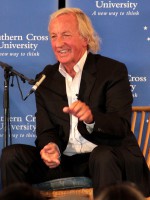Apartheid Did Not Die est un film de genre Documentaire réalisé par John Pilger avec John Pilger
Apartheid Did Not Die (1998)
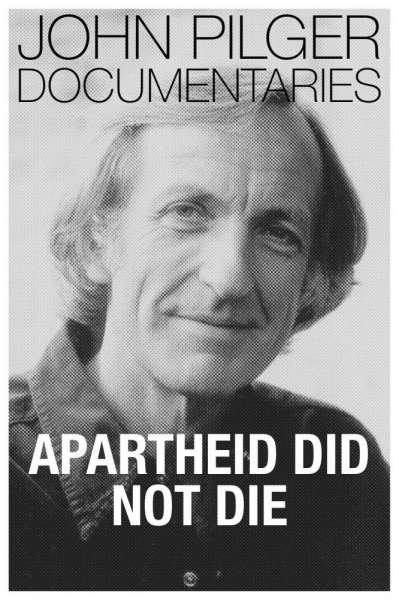
Si vous aimez ce film, faites-le savoir !
Durée 51minutes
Réalisé par John Pilger
Genres Documentaire
Themes Afrique post-coloniale, Le racisme, Documentaire sur la discrimination, Documentaire sur le droit, Documentaire sur une personnalité, Documentaire sur la politique, Politique
Note68%










Apartheid Did Not Die is a 1998 Carlton Television documentary, written and presented by John Pilger, which was directed and produced by Alan Lowery, which provides analysis of South Africa's then new, democratic government.
Acteurs
Commentaires
Postez un commentaire :
Suggestions de films similaires à Apartheid Did Not Die
Il y a 11 films ayant les mêmes acteurs, 8 films avec le même réalisateur, 8959 ayant les mêmes genres cinématographiques, 11131 films qui ont les mêmes thèmes (dont 37 films qui ont les mêmes 7 thèmes que Apartheid Did Not Die), pour avoir au final 70 suggestions de films similaires.Si vous avez aimé Apartheid Did Not Die, vous aimerez sûrement les films similaires suivants :
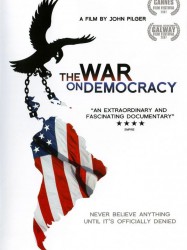
The War on Democracy (2007)
, 1h36Réalisé par John Pilger
Genres Guerre, Documentaire, Historique
Thèmes La mer, Transport, Documentaire sur le droit, Documentaire historique, Documentaire sur la politique, Politique, Les dictatures latino-américaines
Acteurs John Pilger, Ronald Reagan
Note80%





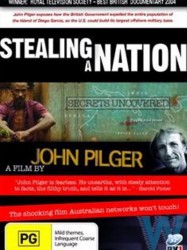
Stealing a Nation (2004)
, 56minutesRéalisé par John Pilger
Genres Documentaire
Thèmes Documentaire sur le droit, Documentaire sur la politique, Politique
Acteurs John Pilger
Note82%





In the 1960s and 70s, British governments, conspiring with American officials, tricked into leaving, then expelled the entire population of the Chagos islands in the Indian Ocean. The aim was to give the principal island of this Crown Colony, Diego Garcia, to the Americans who wanted it as a major military base. Indeed, from Diego Garcia US planes have since bombed Afghanistan and Iraq. The story is told by islanders who were dumped in the slums of Mauritius and in the words of the British officials who left a 'paper trail' of what the International Criminal Court now describes as 'a crime against humanity'.

The New Rulers of the World (2001)
, 1h5Réalisé par John Pilger
Origine Royaume-uni
Genres Documentaire
Thèmes Documentaire sur la politique, Politique
Acteurs John Pilger
Note77%





John Pilger explores the impact of globalisation, taking Indonesia as his prime example, a country that the World Bank described as a "model pupil" until its 'globalised' economy collapsed in 1998. Under scrutiny are the increasingly powerful multinationals and the institutions that back them, notably the IMF and The World Bank.
 , 1h14
, 1h14Réalisé par John Pilger
Origine Royaume-uni
Genres Documentaire
Thèmes Documentaire sur la politique, Politique
Acteurs John Pilger
Note78%





John Pilger and Alan Lowery traveled to Iraq with Denis Halliday, a former assistant secretary-general of the United Nations who resigned over what he called the "immoral policy" of economic sanctions. There they expected to find a suffering nation held hostage to the compliance of a dictator, Saddam Hussein. What they found was a country being slowly strangled by a draconian U.S./U.K. blockade.

Utopia (2013)
, 1h50Réalisé par John Pilger
Genres Documentaire
Thèmes La mer, Transport, Documentaire sur le droit, Documentaire sur la guerre, Documentaire historique, Politique
Acteurs John Pilger
Note76%





The film begins with Pilger's journey to Utopia to observe the changes that have occurred in Aboriginal Australia between 1985, when he featured the poverty in the documentary The Secret Country and the time of filming, 2013. After almost three decades, Pilger discovers that Aboriginal families are still living in extremely overcrowded and poorly sanitized asbestos shacks, and are plagued by easily curable diseases. The Secretary General of Amnesty International, Salil Shetty, who happens to be in Utopia at the same time as Pilger, ponders why one of the world's richest countries cannot solve the problem of Aboriginal poverty and states that the inequity and injustice could be fixed if the will to do so existed. The film goes on to explore some of the issues currently afflicting Australia such as; failed health policies, Aboriginal deaths in police custody, mining companies failing to share the wealth they have acquired with the first Australians and the disputed allegations made by the media and government that there were pedophile rings, petrol warlords and sex slaves in Aboriginal communities and the resulting 2007 intervention. The film also features a visit to Rottnest Island, Western Australia, where an area that was used as a prison for Aboriginal people until 1931, has now been converted into a luxury hotel where tourists are not even informed of the island's brutal history.
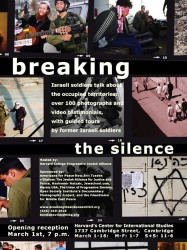 , 52minutes
, 52minutesRéalisé par John Pilger
Genres Documentaire
Thèmes Documentaire sur la guerre, Documentaire historique, Politique
Acteurs John Pilger
Note78%





The documentary attempts to contrast the proclaimed aims of the War on Terror with, what Pilger sees, as the humanitarian failures in countries such as Afghanistan and Iraq. It asserts that the Afghan mujahideen and Afghan Arabs including Osama bin Laden, from which later both the Taliban and Al Qaeda were created, received support from the United States and by Britain's MI6. Pilger alleges that President Jimmy Carter authorised a five-hundred million dollar programme to help set up the native Afghan mujahideen, starting as early as six months prior to the Soviet invasion into Afghanistan.
 , 53minutes
, 53minutesRéalisé par John Pilger
Genres Documentaire, Historique
Thèmes La mer, Transport, Documentaire sur le droit
Acteurs John Pilger
Note74%





The Secret Country: The First Australians Fight Back shows that when British colonists first arrived in Australia, they saw Aboriginal Australians as having no proprietorial rights to their land because they didn't cultivate it. As a result of this, no treaty was ever signed. Aboriginal Australians had no rights under British colonial rule and much of their resistance to British colonisation wasn't recorded. John Pilger aims to document some of the historical struggles of Aboriginal people as they were driven from their lands and he follows some of the major events relating to Aboriginal rights throughout the 20th century.

The War You Don't See (2010)
, 1h37Réalisé par John Pilger
Origine Royaume-uni
Genres Documentaire
Thèmes Documentaire sur la guerre, Documentaire historique, Politique
Acteurs John Pilger
Note83%





The film begins with footage of an unreported July 12, 2007 Baghdad airstrike and black and white stills of the victims of the U.S. Occupation of Iraq. In his opening narration Pilger quotes World War I British Prime Minister David Lloyd George’s comment to Guardian editor C. P. Scott that, “If the people really knew the truth, the war would be stopped tomorrow.” He goes on to state that this film will draw on his own experience as a war correspondent to question the role of the media in conflicts such as Iraq and Afghanistan.

Vietnam: The Last Battle (1995)
, 51minutesGenres Documentaire
Thèmes Documentaire sur la guerre, Documentaire historique, Politique
Acteurs John Pilger
Pilger introduces the film, on the 20th anniversary of the end of the conflict, from the roof of the U.S. Embassy, Saigon, where the last American troops had departed by helicopter. Veteran Bobby Muller, interviewed on China Beach, calls the war a lie and talks about his own belief of this soon after his landing there in 1965. Pilger states that Ho Chi Minh had quoted from the U.S. Declaration of Independence and sought support from Washington for his nation’s independence. An elderly woman, who lost of her husband and five children fighting the French and the Americans, is shown as an exemplar of the struggle for independence. Coal miner Pham Ngo Duc describes the massive American bombing, which, according to Pilger, journalists James Cameron and Harrison Salisbury, were vilified for reporting. Pilger recounts the final evacuation of the U.S. Embassy and what he deems as the "peaceful" arrival of the North Vietnamese, which ended the war.
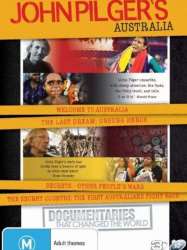
Welcome to Australia (1999)
, 50minutesGenres Documentaire
Thèmes La mer, Sport, Transport, Documentaire sur le sport, Documentaire sur le droit
Acteurs John Pilger
Note75%





In the build-up to the Sydney 2000 Summer Olympic Games, Pilger finds that the elaborate preparations for the Olympics are overshadowing the reality of many Australia's Aboriginal citizens, who he argues continue to remain excluded, impoverished and mistreated in Australia. The film uses sport as a mechanism to draw attention to and tell the story of the injustices endured by Aboriginal Australians while also arguing that Aboriginal Australians could have had a much more significant impact on Australian sport if they had not been deliberately prevented from doing so.
 Connexion
Connexion
